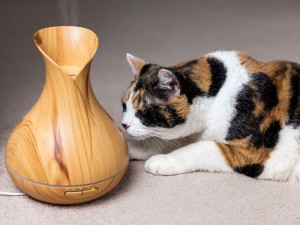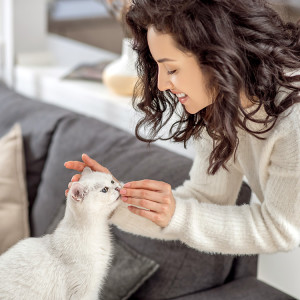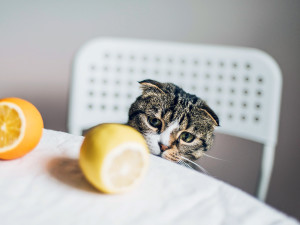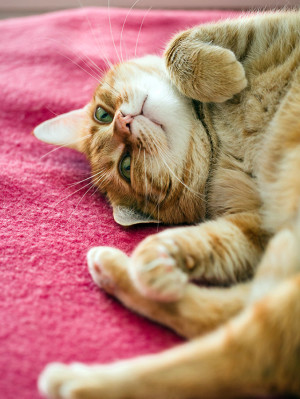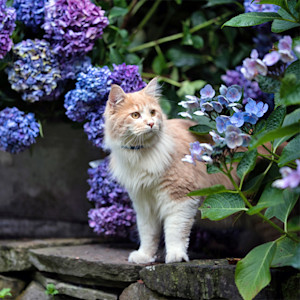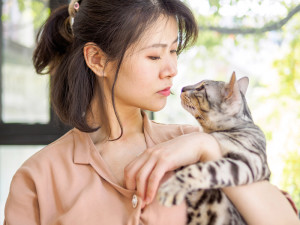Is Lavender Essential Oil Safe for Cats?
Be aware of what is safe for your kitty.
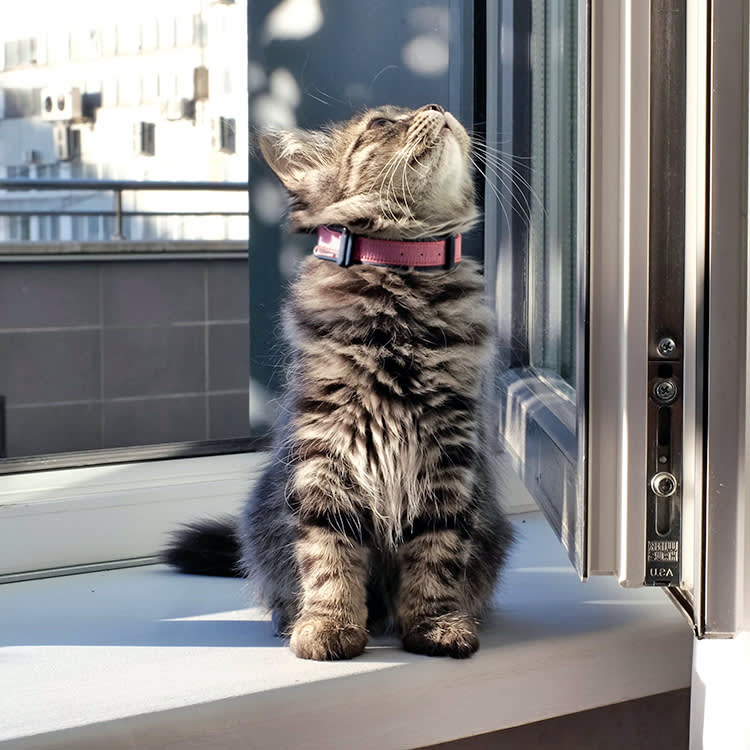
Share Article
In This Article:
What Is Lavender Essential Oil? Is Lavender Oil Safe for Cats? How to Safely Use Lavender Around Cats Alternatives to Lavender Oil for Cats
You’d be hard-pressed to find a cleaner, a personal product, or even a homeopathic medicine that doesn’t contain essential oils, especially if you’re looking at a product that is supposed to promote relaxation. Lavender essential oil is a common ingredient meant to improve sleep and promote ultimate calmness — a few things you may want to impress upon your kitty. However, lavender essential oil can be toxic to cats.
What is lavender essential oil?
Lavender essential oil is the concentrated juice from a lavender plant that contains the compounds responsible for its smell and flavor, specifically linalool and linalyl acetate. These compounds are then either absorbed through the skin or inhaled through the nose, where they travel to the brain — specifically the amygdala, which is the emotional center of the brain. Here, these compounds can influence behavior.

Common uses for lavender oil
When lavender oil compounds reach the brain, the main effect is similar to sedation. Although it won’t knock you (or your cat) out, it promotes melatonin release to enhance sleepiness. It also affects neurotransmitters in a way that reduces stress and anxiety, which can have a calming effect.
Lavender oil can be diffused for inhalation or rubbed directly on the skin. Lavender oil does seem to have some antibacterial effectsopens in new tab, potentially making it useful for some staphylococcus infections, including some strains of MRSA. It may also help regrow hair, as a bonus.
Is lavender oil safe for cats?
Lavender essential oil seems to have it all when it comes to decreasing stress, but when it comes to your cat, lavender oil is a no-go. (As a quick side note, many essential oils are also dangerous to dogs, so speak to your veterinarian before using any essential oil products in your home.)
Potential benefits
What cat doesn’t need a bit of chill every once in a while? Most cats tend to operate at slightly higher anxiety levels, especially when introduced into a new environment or experiencing a schedule change. Instead of letting them hide under your bed for the next two weeks, diffusing a little lavender essential oil may seem appealing. The thing is, it’s potentially hazardous for them. So, look for other calming options instead.
Toxicity concerns of cats and lavender oil
Although linalool and linalyl acetate seem to work well in most humans, cats can’t process them. Their livers just don’t have the means for it. These compounds will build up in their systems, potentially to toxic levels. So you clearly shouldn’t apply lavender essential oil to your cat, but what about diffusing it?
Even essential oils that are diffused still have the ability to be ingested. Cats are fastidious groomers and can swallow lavender oil droplets that settle on their hair coats. Also, a cat’s respiratory system is very sensitive to irritants such as chemicals, smoke, dust, and even strong scents. That’s why some will turn up their nose at scented cat litter. Diffusing essential oils can make your cat cough, sneeze, have a runny nose and eyes, or worse.
Symptoms of lavender oil poisoning in cats
It doesn’t take a lot of lavender oil to negatively affect your cat. Signs of lavender oil toxicity include:
Lethargy
Vomiting and diarrhea
Drooling
Coughing, sneezing, difficulty breathing
Not eating
Weakness
Muscle tremors
If you know your cat ingested lavender oil or was around a diffuser, don’t wait for signs to show up. Instead, contact your veterinarian as soon as possible.
How to safely use lavender around cats
Using lavender essential oil around your cat isn’t necessary for their health. But if you and your vet feel that it may be a natural way to reduce stress and anxiety, there are safer ways to get the benefits. Please keep in mind that these methods are only considered safer, not necessarily fool-proof or 100 percent risk-free.
The biggest concern with lavender oil toxicity in cats is ingestion, so keeping the oil out of their reach is the number-one priority. Diffusing oil is the safer option, but you need to make sure the diffuser is used where they can’t get to it — and provide as much ventilation as possible. Remember the risks of respiratory irritation and licking droplets from their coat? The more spread out those oil droplets are, the better it will be for your cat. So, don’t put them in a small room with the diffuser. Instead, use it in an open space, preferably with a fresh air source moving through.
You can also dilute the lavender essential oil so any droplets your cat may come in contact with are less concentrated.
Alternatives to lavender oil for cats
Lavender oil isn’t the only thing that can calm your kitty and promote healthy sleep. You can reduce their stress through exercise and enrichment: lots of playtime, cat trees, interactive toys, or play sessions. For best results, exercise needs to be daily, so pencil in some time every day to be with your cat and encourage movement. This doesn’t have to take a long time, just a few 10-minute sessions spread throughout the day.
Another stress-reducing option is to make a safe space for your cat. Find a quiet, dark corner of your home outfitted with a comfy bed, food, water, and a litter box. It should be out of the way so that your cat can escape the hustle and bustle, but not so far away that they won’t use it. Consider using a white-noise machine if your cat gets stressed by sounds, and rotate some of their favorite toys through the space for entertainment and familiarity.
Stick to a schedule that your cat can trust. A major cause of stress is the unknown, so try to feed and play with your cat at the same times each day. Knowing what’s coming and when really helps calm anxious nerves.
If your cat still needs some help with being calm, talk to your veterinarian. Many natural supplements may work, as well as pheromones that can be diffused or sprayed.
Bottom line
Although lavender essential oil may be popular for many things in the human world, it really has no place in your cat’s.
Diffusing lavender oil around your cat (or applying it to them) can cause serious toxicity issues, including digestive problems, tremors, weakness, and lethargy.
Rather than turning to lavender oil to calm and soothe your cat, look to other stress-reducing strategies such as exercise, a safe escape spot, or natural supplements recommended by your veterinarian.
References
Johns Hopkins Medicine. “Aromatherapy: Do Essential Oils Really Work?” John Hopkins Medicine, 2019, www.hopkinsmedicine.org/health/wellness-and-prevention/aromatherapy-do-essential-oils-really-workopens in new tab.
Truong, Sandra, and Poonam Mudgil. “The Antibacterial Effectiveness of Lavender Essential Oil against Methicillin-Resistant Staphylococcus Aureus: A Systematic Review.” Frontiers in Pharmacology, vol. 14, 2023, p. 1306003, pubmed.ncbi.nlm.nih.gov/38130406/opens in new tab, https://doi.org/10.3389/fphar.2023.1306003opens in new tab. Accessed 13 Feb. 2024.

Dr. Chyrle Bonk, DVM
Dr. Chyrle Bonk has been a mixed-animal veterinarian since 2010, with a special interest in rehabilitation. When she's not practicing or writing about veterinary medicine, you may find her exploring the outdoors with her family or tending to her cows, horses, chickens, or cats and dogs.
Related articles
![A dog standing in a lavender field.]()
Do Essential Oils Pass the Smell Test?
A psychologist explains how stimulating scents can influence a dog’s behavior.
![Woman giving her white cat a vitamin.]()
Does My Cat Need Supplements?
![Home cat sitting on a chair with citrus.]()
Everything You Need to Know About Your Cat’s Incredibly Powerful Nose
They have up to 200 million odor receptors that can pick up all the good (and horrible) smells. Learn how to best support their sensitive sniffers.
How Do Cat Diffusers Work?
Learn how you can get your chronically anxious cat to chill.
![a cat peaking out from some hydrangeas]()
Are Hydrangeas Toxic to Cats?
They make your lawn look picture-perfect, but keep your cat away. Here’s why.
![Cat looking at human]()
Does Your Scent Actually Help Calm Your Cat?
They want you around more than your sweaty T-shirt in their carrier, but thanks for the thought.


